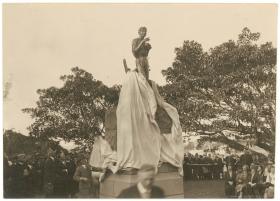Henry Lawson the poet
Key inquiry question #1
Unveiling Lawson statue, c. 1905-1955, Sam Hood
Key inquiry question #2
Henry Lawson, 1915, William Johnson
Key inquiry question #3
Henry Lawson – While the Billy Boils
Featured content
Text Type
- Informative: description of poem
- Informative: analysis of language features of poem
- Imaginative: illustration of poem
Background notes for teachers
The author Libby Hathorn has compiled a book, The ABC Book of Australian Poetry: A treasury of poems for young people, which includes a number of Henry Lawson poems you may wish to suggest to your students.
These poems are:
- The Never-Never Land
- Trouble on the Selection
- The Days When We Went Swimming
- On the Night Train
- Ballad of the Drover
- Andy’s Gone with Cattle
Student Activities
Henry Lawson the Poet
Students study one poem by Henry Lawson in depth, investigating a range of language forms and features, before illustrating their poem to reflect the imagery portrayed in the words, and reciting their poem to the class.

NSW Syllabus for the Australian Curriculum: English K-10
A student:
- communicates effectively for a variety of audiences and purposes using increasingly challenging topics, ideas, issues and language forms and features EN3-1A
- uses an integrated range of skills, strategies and knowledge to read, view and comprehend a wide range of texts in different media and technologies EN3-3A
- uses knowledge of sentence structure, grammar, punctuation and vocabulary to respond to and compose clear and cohesive texts in different media and technologies EN3-6B
- thinks imaginatively, creatively, interpretively and critically about information and ideas and identifies connections between texts when responding to and composing texts EN3-7C
Students:
EN3-1A
Respond to and compose texts
- Use interaction skills, varying conventions of spoken interactions such as voice volume, tone, pitch and pace, according to group size, formality of interaction and needs and expertise of the audience
- Discuss and experiment with ways to strengthen and refine spoken texts in order to entertain, inform, persuade or inspire the audience
EN3-3A
Respond to, read and view texts
- Summarise a text and evaluate the intended message or theme
EN3-6B
Understand and apply knowledge of language forms and features
- Understand how noun groups/phrases and adjective groups/phrases can be expanded in a variety of ways to provide a fuller description of the person, place, thing or idea
EN3-7C
Understand and apply knowledge of language forms and features
- Identify the relationship between words, sounds, imagery and language patterns in narratives and poetry such as ballads, limericks and free verse
In each year of Stage 3, students must study examples of:
- Print texts
Across the stage, the selection must give students experiences of:
- Texts which are widely regarded as quality literature
- A wide range of literary texts from other countries and times, including poetry, drama scripts, prose fiction and picture books
Learning across the curriculum
General capabilities:
- Critical and creative thinking
- Literacy